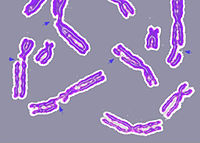
Photo from wikipedia
Abstract Temperature significantly affects the physical and mechanical properties of granite. To have a comprehensive understanding of the thermal cycle effect on uniaxial compressive strength (UCS) and thermal damage rate,… Click to show full abstract
Abstract Temperature significantly affects the physical and mechanical properties of granite. To have a comprehensive understanding of the thermal cycle effect on uniaxial compressive strength (UCS) and thermal damage rate, a series of thermal cycle experiments on granite specimens were carried out with five types of designed temperatures and five types of cycle number of thermal treatments. The experimental results indicate that UCS decreases and thermal damage rate increases as temperature and thermal cycle increase. UCS of specimens cooled in water condition after thermal damage treatment are lower than those cooled in air condition. In addition, two new phenomena related to thermal damage rate were observed. Firstly, previous studies have shown that a rapid value reduction of UCS of specimens with one thermal cycle treatment under air cooling condition can be observed at 400∘C. While the temperature threshold for the specimens treated with more than one thermal cycle under water cooling condition increases to 550∘C. Secondly, a thoroughly antipodal evolution law of the thermal damage rate for the specimens with multiple thermal cycle treatments is also observed as compared to those treated by only one thermal cycle. These differences might be induced by the different microcrack initial time and their development speed. The new findings are important to understand the failure mechanism and variation process of physical and mechanical properties of granite specimens subjected to thermal cycles.
Journal Title: High Temperature Materials and Processes
Year Published: 2019
Link to full text (if available)
Share on Social Media: Sign Up to like & get
recommendations!